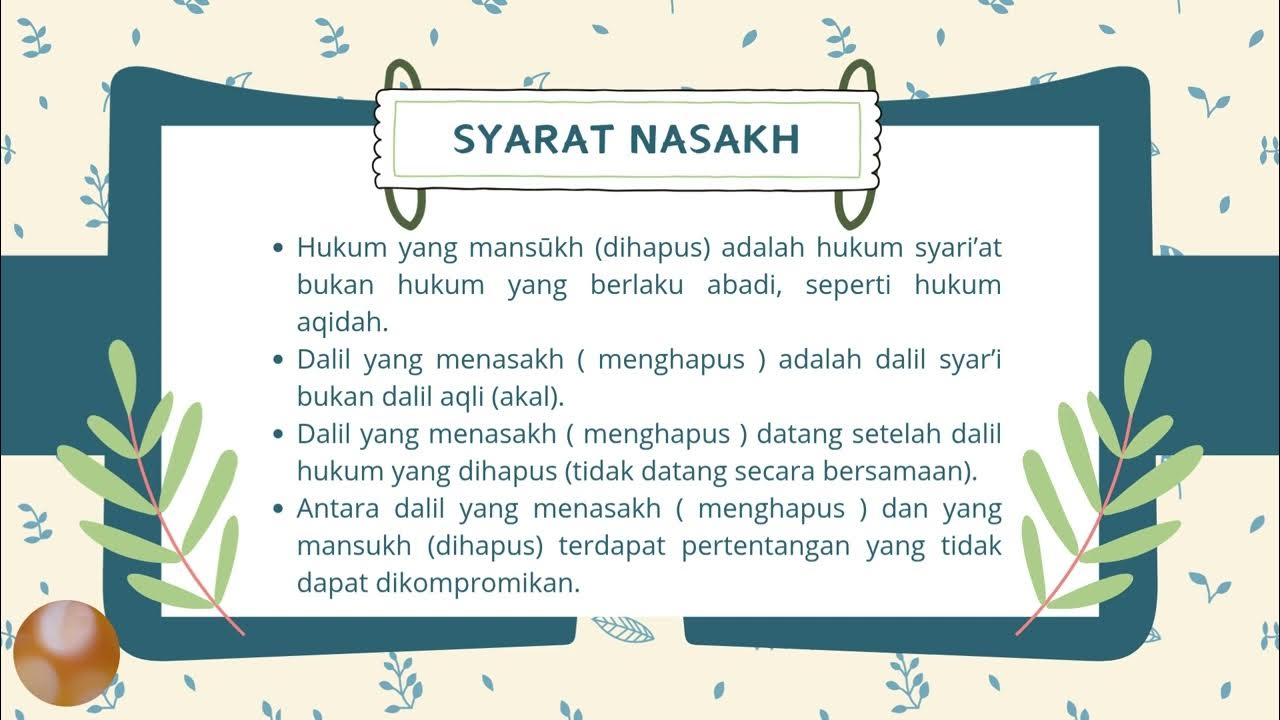Karena hal ini, MIRAS pun diharamkan!
Summary
TLDRThe video discusses the Islamic perspective on alcoholic drinks (khamr) and their gradual prohibition. Initially, alcohol was permissible, but the Quran introduced restrictions in stages, highlighting the negative effects and dangers of drinking, such as loss of rational thinking and harmful behaviors. Eventually, a definitive prohibition was established, making khamr consumption haram (forbidden) in Islam. The narrative emphasizes how the gradual approach allowed the early Muslim community to adjust and overcome their drinking habits. The video concludes with a call to avoid khamr and follow Islamic teachings for a righteous life.
Takeaways
- 🧐 Miras (alcoholic drinks) are intoxicating beverages made from the fermentation of carbohydrate-containing plants, like beer and wine.
- 🌍 Every part of the world has its own alcoholic beverages, and even within Indonesia, various regions have their own types of miras.
- 🍇 In the Arab world, alcohol is called 'khamr,' derived from the root word meaning 'cover,' as it clouds the mind and affects one's mental clarity.
- 📖 Islam prohibits the consumption of alcohol (khamr) due to its negative effects, as stated in the Quran.
- 🛑 Allah’s prohibition of alcohol was not immediate but occurred in stages, starting with its initial acceptance in pre-Islamic Arabia.
- 📜 Early Islamic teachings highlighted the negative aspects of alcohol, even though it wasn't initially banned.
- 🚫 A significant turning point was when an inebriated man incorrectly recited the Quran during prayer, prompting further restrictions on alcohol consumption, especially before prayers.
- ⚠️ Over time, more explicit prohibitions on alcohol were revealed, with Allah declaring that alcohol and gambling were sinful acts.
- 👥 Historical incidents, such as fights between intoxicated tribes, further emphasized the social harm of alcohol, strengthening the case for its prohibition.
- ☠️ The Prophet Muhammad emphasized the dangers of alcohol, calling it the 'mother of all evils,' and extended the prohibition to anyone involved in its production, distribution, or sale.
Q & A
What is the definition of 'miras' according to the KBBI?
-'Miras' or alcoholic beverages are defined as intoxicating drinks like beer, red wine, and other alcohol-containing drinks obtained through the fermentation of plant materials rich in carbohydrates.
Why is 'khamr' used to describe alcoholic beverages in Arabic?
-'Khamr' is used to describe alcoholic beverages because it is derived from the root word meaning 'to cover.' In this context, it refers to how alcohol 'covers' or clouds one's rational mind, leading to intoxication.
What does Islam say about the consumption of khamr (alcohol)?
-In Islam, the consumption of khamr (alcohol) is haram (forbidden). Allah, through the Qur'an, states that khamr is an act of Satan, and its harm is far greater than its benefit.
How did Allah gradually prohibit the consumption of khamr?
-The prohibition of khamr was revealed in stages. Initially, khamr was permissible and widely consumed. The first hint of its disapproval came when Allah mentioned its intoxicating nature. Later, Muslims were forbidden to approach prayer while intoxicated, and finally, its complete prohibition was revealed, equating it with acts of gambling and idolatry.
What were the initial signs that khamr might not be permissible in Islam?
-The initial signs came when Allah referred to khamr as 'intoxicating,' a word with negative connotations, which led some companions to sense that its consumption might be undesirable.
What event triggered the second revelation regarding khamr?
-The second revelation occurred after an incident where a companion, leading prayer while intoxicated, misread the verses of Surah Al-Kafirun, prompting Allah to reveal that believers should not pray while intoxicated.
How did the complete prohibition of khamr impact the Muslim community?
-Once khamr was completely prohibited, Muslims poured out their alcohol, and the streets of Madinah flowed with it. This demonstrated their strong obedience to Allah's command and their effort to break the deeply ingrained habit of consuming alcohol.
What did Prophet Muhammad (PBUH) call khamr after its prohibition?
-Prophet Muhammad (PBUH) referred to khamr as 'ummul khabaith' or 'the mother of all evils,' indicating that it leads to various other sinful behaviors.
Who are the ten types of people the Prophet Muhammad (PBUH) cursed regarding khamr?
-The Prophet Muhammad (PBUH) cursed ten types of people related to khamr: the one who produces it, the one who asks for it to be produced, the one who drinks it, the one who transports it, the one for whom it is transported, the one who serves it, the one who sells it, the one who profits from its sale, the one who buys it, and the one who requests it to be bought.
Why was the gradual prohibition of khamr important for the Muslim community?
-The gradual prohibition allowed Muslims to slowly reduce their consumption of khamr, as it was a deeply ingrained cultural habit. By providing stages, it became easier for them to adjust and eventually stop, rather than facing an abrupt, immediate ban.
Outlines

This section is available to paid users only. Please upgrade to access this part.
Upgrade NowMindmap

This section is available to paid users only. Please upgrade to access this part.
Upgrade NowKeywords

This section is available to paid users only. Please upgrade to access this part.
Upgrade NowHighlights

This section is available to paid users only. Please upgrade to access this part.
Upgrade NowTranscripts

This section is available to paid users only. Please upgrade to access this part.
Upgrade NowBrowse More Related Video
5.0 / 5 (0 votes)





